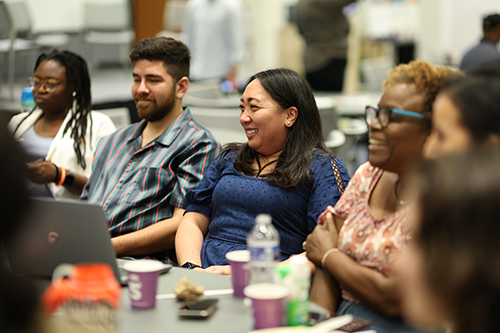
Working alone, co-ops help people in meaningful, measurable ways—whether by providing affordable housing and reliable broadband, or by creating job stability and financial security.
In this week’s Principle 6 Newsletter, Mike Mercer writes that if they worked together, co-ops could multiply that impact and transform the world. “Co-ops are inherently in the business of causing change,” he says.
Read the full issue of Principle 6 Newsletter below to learn more. And while you’re thinking about “cooperation among cooperatives,” take a moment to consider how you and your cooperative practice this principle. NCBA CLUSA is on a mission to document Principle 6 collaborations across the country so we can identify trends, document best practices and share this knowledge with you—our fellow cooperators!
Share your example of Principle 6
Principle 6 Newsletter – Are co-ops change agents?
Issue 27 – August 11, 2021
…cooperatives don’t and can’t organize the working class to fight the ruling class for wealth and power. Instead, they seek to build and develop a tiny slice of capital outside of the direct control of big industrialists. In other words, cooperatives retreat from the direct struggle between workers and owners to instead build worker-owners. – Molinari, Owens and Fontana, “You Can’t Win Without a Fight: Why Worker Cooperatives are a Bad Strategy,” Organizing Work, 1-29-21
Independent Drivers Guild followed the typical union strategy, fighting for collective bargaining agreements with the big, established employers—and has won some concessions like tips and a minimum pay. But hearing from drivers, (Erik) Forman noticed that what resonated most deeply with many was the idea of ownership. “I decided to look for ways to help workers make their dreams come true,” he says…“imagine how worker-ownership could transform the industry.” – Kristin Toussaint, “How the Drivers Co-op Built a Worker-Owned Alternative to Uber and Lyft,” Fast Company, 7-15-21
Among all of the problems with twenty-first century work—the ballooning of the low wage service sector, economic inequality—the main problem really is that there are so few realistic alternatives. What has been missing from the debate about the future of work is an approach that offers people a realistic alternative. – Trebor Scholz, “Uberworked and Underpaid,” 2017

The “invisible hand” of the free market leaves people behind and the heavy hand of government often keeps people down. The cooperative model helps workers, artists, consumers, farmers, small businesses and others be a little less behind. It also helps to lift people a little above their current circumstances, perhaps breaking the welfare cycle, escaping the rental trap, or competing successfully with the big box stores. Over time, some have argued that co-ops should disrupt the workings of the invisible and heavy hands, ushering in a new economic/social order.
Successful co-ops create tangible value for their members. Credit unions provide members with affordable credit and good prices for financial services. Co-op groceries assure members of quality food at reasonable prices. Energy co-ops provide dependable and cost-effective electricity. Worker co-ops give wage laborers better control over their work environment and a bigger slice of the economic pie. In these ways, co-ops improve the well-being of those being served. Not so much changing by economic order or political fabric but by improving existing circumstances for members.
Co-ops improve the well-being of those being served. Not so much changing by economic order or political fabric but by improving existing circumstances for members.
Credit union people often wonder how it is that the word “union” became part of their defining identity. In some parts of the country, that word doesn’t land on receptive ears. In fact, a few employers have insisted on using the name “credit association” to avoid any connection with unionized labor. While the word “union” derives from the constructive notion of “people joining around a common interest,” it also has a long history of anti-management connotations in the U.S.
One has to wonder about the original thoughts behind the selection of “credit union” to describe American cooperative financial institutions. Wikipedia points to the Germans. That’s another story. But there is a long history of co-op association with labor unions in this country. Unions formed cooperative company stores and often considered worker co-ops to be the long-term solution to their struggles with industrial owners and management. Co-ops were seen by labor unions as a way to change the economic balance of power. And more than a few labor union-affiliated credit unions were organized along the way.
Today, most co-ops are organizations of and for the members that they serve. There are still special relationships with sponsor and partner organizations. But the sense of purpose is directed to the members. The reward systems are usually built around growth. Growth is regarded as evidence that the value proposition with members is where it should be. Thoughts about economic reform or advancing society are distant, if at all. Rarely is taking sides between capital and labor, business and government, or liberals and conservatives a serious consideration. Fairness and inclusivity are part of the DNA of most co-ops. Divisiveness and revolution are not.
Co-ops are inherently in the business of causing change.
To the untrained eye, co-ops (especially credit unions) do not look to be change agents. But, doing what they do, co-ops are inherently in the business of causing change. They are living examples of the change in commercial priorities from maximum return on capital to enhanced benefit for those being served. And, in the age of extreme political polarization, co-ops illustrate the exercise of constructive democratic processes. Perhaps most disruptive, co-ops enable people of modest means to obtain some degree of control over the things that matter most in their lives. In such there is considerable dignity. By these measures, co-ops are certainly agents of change.
Working alone, co-ops help people in meaningful ways.
Working together, co-ops lift people in virtuous ways.
And that could change the world!
Stay tuned,
Mike


